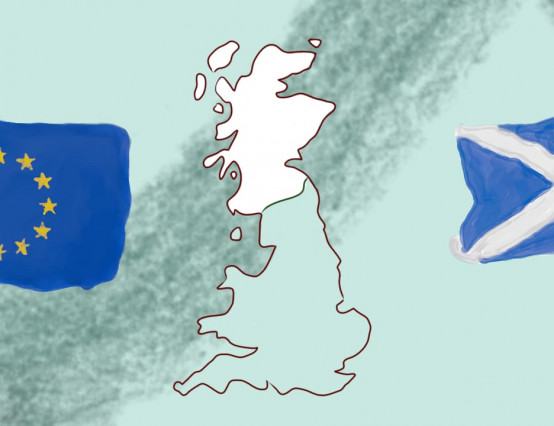The following interview was transcribed, and has been lightly edited for brevity and clarity.
Can you first introduce yourself and your organisation?
Of course. So my name's Martin Gavin and my title is improvement lead (which hopefully says it all) at Homeless Network Scotland. Most of my role is connected to communication, stake-holder engagement, that sort of thing. But I do all sorts of bits and pieces too.
Is there anything that Homeless Network Scotland does during the festive season specifically to help homeless people?
The approach to homelessness, in Scotland particularly, is an all year-round exercise really, what we would call systems change. And one of the reasons that there is traditionally a focus on homelessness around Christmastime has probably got more to do with fundraising than it has to do with a specific spike in homelessness itself. Homelessness is a fairly consistent issue in terms of need throughout the year, and not particularly acute around Christmas time, although there are some drivers around this time of the year, around issues like domestic violence in terms of women's homelessness. The issue overall for us as an organisation is really about system change and taking a view across the whole year, rather than focusing in on Christmas.
We're an organisation rooted in knowledge and evidence/research about what works. We are committed to ending homelessness. We do that through prevention, and looking into solutions around solving long-term homelessness.
Would you say there are misconceptions from the general public surrounding homelessness?
People are concerned about homelessness, it's a consistent concern for people when you talk to them about it. People don't necessarily understand the problem fully. I think that's as much to do with the way it's framed and the way it's presented as it is to do with the amount of time people spend trying to work out what the problem really is. I think it's one of those issues where people's understanding isn't necessarily aligned with the reality. Homelessness can very often be invisible. People who are sleeping on a friend's sofa, or maybe sleeping — crashing as it were — with a relative; they don't have a home of their own. That person can be homeless and a lot of people don't realise that. Likewise, somebody who is in temporary accommodation can be classed as homeless.
So there's a wide range of different situations in which an individual can find themselves technically homeless without actually perhaps being in the most visible category, such as rough sleeping, which is the part that people tend to come face to face with on the street.
There are also vulnerable individuals who are begging and not necessarily homeless, so that's another aspect of homelessness which isn't so well understood. It doesn't mean those people are not vulnerable, but they may not be technically homeless, so it's quite a complex issue.
Are there any other misunderstood areas of homelessness that you're passionate about addressing?
One of the phrases that you often hear in relation to this problem is that it can happen to anybody. Phrases like, "we're only a couple of paychecks away from the street". Now that's not untrue, but homelessness is not equal and we're not all at equal risk. Overwhelmingly the main driver for homelessness is poverty. What you'll find is that there are people who are at much greater risk of homelessness than others. To explain what I mean by that, you could be somebody who is experiencing poverty and come from a background from where there are not a lot of resources in place, maybe your family don't have things like credit cards, and you were not served well by the education system or social systems in general and found yourself with perhaps not the same advantages as other people. There are fewer resources in the background to help when things go wrong.
Things like relationship breakdowns or addiction issues, it doesn't take very much for a person to find themselves without a home, without a roof over their head, and not necessarily being able to draw on the resources of friends, family and parents, because the resources may simply not be there. So that is something that is not completely understood. Yes, it can happen to everybody, but there are people who are at much greater risk than others. It's not an equal problem, it's a very unequal problem.
For people who are wanting to help with homelessness, on a general scale or perhaps, if they know someone personally who is experiencing or at risk of homelessness, on an individual scale, what advice would you give?
It may not be the way that most people think, so again there’s a slight misconception around this, but one of the main things I would urge people to do is what we call, 'ask and act'. So if you've got a friend or a family member and you think something's not quite right— Let me give you an example: Say you have a friend and you've said to them a few times, "I'll come round to your place", to watch TV or whatever, and they're putting you off, and they keep doing that, well, have they got a place? Has something happened with their tenancy? Has something happened with the place where they live that they don't live there anymore, you know? Ask. That means "what's your housing situation, is everything alright?" And sometimes people will say, "well, actually, I've had a problem with my landlord, unfortunately I've been evicted." They wouldn't tell you if you don't ask.
Homelessness begins in communities, it doesn't begin under Central Station Bridge or outside Waverley station in Edinburgh. It begins in a community with somebody having to leave their home or being chucked out of their home for whatever reason, or a relationship breakdown or something like that. That person very often has to leave that community because the services they need are not there, they're somewhere else. And that's very often how people find themselves homeless and in a situation where they're a long way from family and from the support networks that maybe they've had previously.
What you're saying is, if people are willing to communicate there's a higher chance of catching the issue at its early stages?
That's exactly it. What we would say is, let's catch this closer to home before it gets to the stage where somebody is packing a bag and getting a train to a different town or a different city because they no longer have that accommodation they had previously.
On another level, there are a number of charities providing services directly to people experiencing homelessness, and of course those organisations are always looking for financial support and it's perfectly okay for people to help in that way. But as I say, if we want to not be talking about homelessness in ten years time let's all play a part in prevention for a start. Whatever our job is, whatever our role is, even if it's just asking friends, let's ask, then let's act on whatever that person tells us. But also press for system change, ask the questions of your councillors, of your MP's, MSPs, why is this happening? Why isn't it changing, why isn't it changing quicker?
Are there any significant differences in terms of homelessness or the policies surrounding it between Scotland and the rest of the UK?
One of the things that Scotland has is a very, what I would call, a robust policy framework. Now that's not a very sexy expression, but actually it's probably the best way to describe a really well thought out suite of policies and legislation around homelessness which is recognised as some of the best in Europe. So we've already got what I'd call a robust policy framework around homelessness and we're building on that with a number of initiatives that are really taking a hold in Scotland, whereas they may be being piloted in other parts of the UK.
One example of that would be something called 'housing first'. 'Housing first' is designed for people who have the sharpest homelessness experiences. That might be people whose homelessness is made worse by mental health, contact with criminal justice, crime, addictions, that type of thing. The technical expression would be 'severe multiple disadvantage', so lots of things happening to you and none of them good. Many people find themselves in that situation, again driven by poverty and lack of opportunity and will go round and round the system for many years.
Part of the reason for that is because traditionally we've had in place something called a staircase model. That meant that people had to meet certain conditions before they could move to the next step. It very often meant that, for instance, individuals who might have addictions were never really able to get to the point where they had a tenancy, because there were too many obstacles in place from the staircase model to enable them to reach a point of stability, which could help them overcome their addiction.
About 25 years ago a psychologist in America came up with the 'housing first' principle. The idea is to get, well, just as it says, it's to get somebody into a house first, and then work with them and try to address some of the issues that they might have that's causing them to go round and round the homelessness system, and this proved very successful: give them a house, they're not homeless anymore. If you put it like that, it sounds ridiculous, but if you want to talk about ending homelessness, well if you give someone a home they're no longer homeless.
In terms of research, evidence, what they call 'gold standard' academic research, there's more to support the 'housing first' approach than there is for any other intervention on homelessness. The idea is this gets people into a home and with wraparound support we can work with that individual to help them to build and live their life, whatever that means to them.
Not only are the outcomes better for the individual but the outcomes for society are arguably better as well. It's more cost effective to support people in that way because it's a managed situation, it's not the chaos of rough sleeping. All in all 'housing first' is a really good example of something that's now just about to be rolled out across the whole of Scotland.
All Scotland's local authorities have been thinking about how they can implement 'housing first' in their areas, and the majority are now doing so. For people with the toughest experiences of homelessness, the people who tend to come back again and again, the people who need support, really intense support, this 'housing first' approach has been very successful. Now that's something that's been piloting in England, but we're just about to roll it out across the whole of Scotland.
March next year we'll be finishing up something called the 'housing first' pathfinder, which was running in Glasgow, Edinburgh, Dundee, Stirling and Aberdeen/Aberdeenshire. So far around 550 people have been placed into their own tenancies. That's people who were formerly homeless, sometimes for many, many years with really complex problems, and about 85% of these guys are sustaining their tenancies with the right support, which is very high for that group.
Is there a lot to be optimistic about for the future then?
We've still got a long way to go, but we think if we do everything that we should be doing around prevention and all of the progressive policies we have in Scotland, we think we can end homelessness within the decade. I think the least we can do frankly, is to have an ambitious objective. Now some people might say, "well why wait ten years?" That's a fair question. There is a practical element to it, building houses, putting systems in place that are different from the ones we have at the moment, just embedding all of that and making it work properly, but the key of course is to have a system that responds well to homelessness when it does happen and does all it can to prevent it.
This post has been updated for clarifications









0 Comments